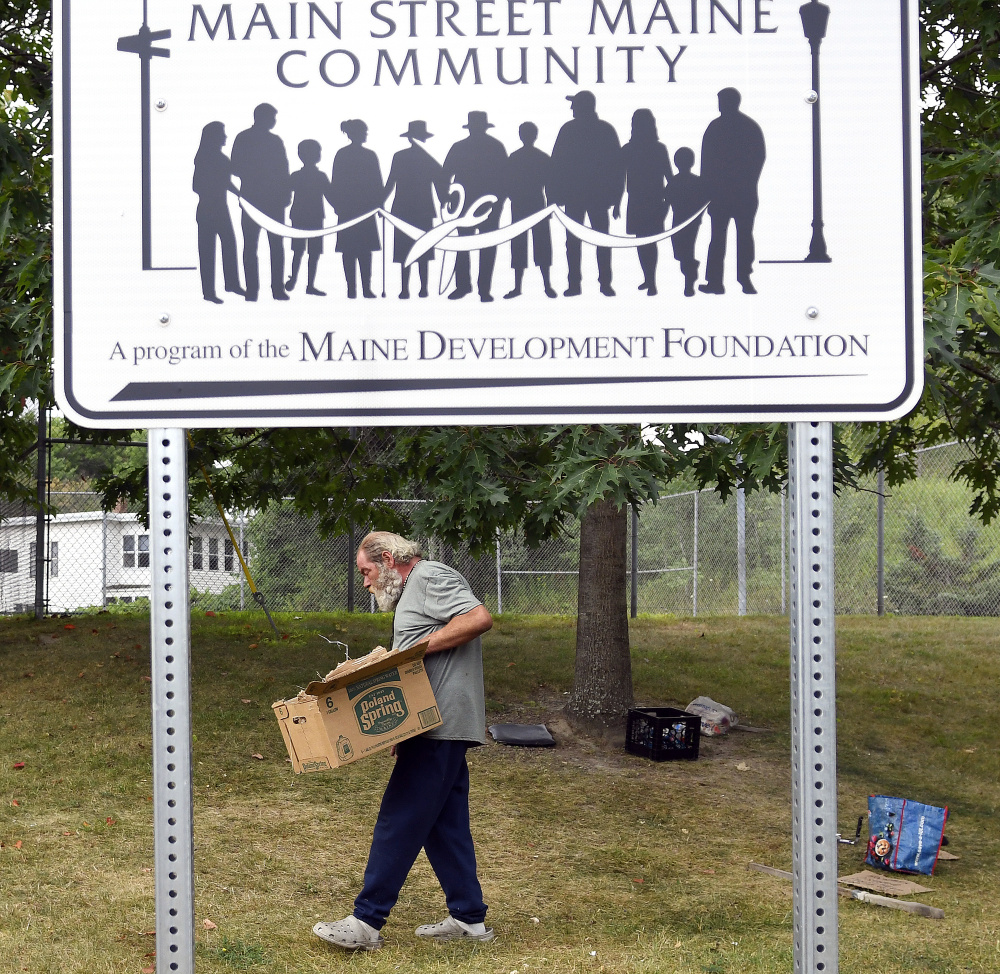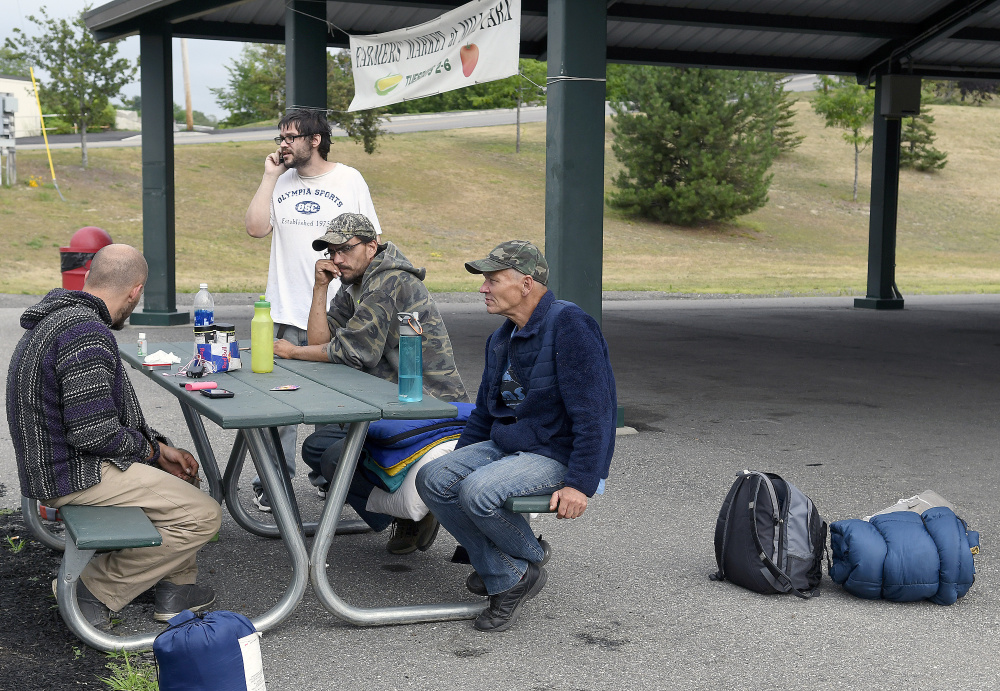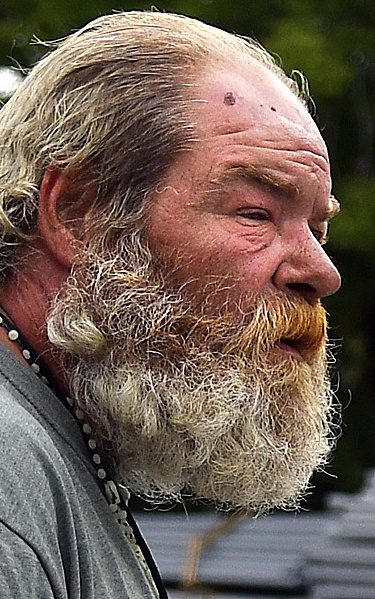AUGUSTA — Paul Merrick, homeless for the past six summers, has a number of campsites around Augusta where he lays his head at night.
But increasingly, he and other people who are homeless say, he has been booted out of some of his in-town sleeping spots by police.
City officials say they’re not out actively searching the woods looking to roust Augusta’s homeless from their campsites. They say they’ve seen an increase in the prevalence of illegal homeless camping on public property in Augusta – and undesirable activity taking place at the sites.
And when they see it, or someone complains about it, they do take action and have warned such campers that they cannot stay overnight in city parks or on other public property in Augusta, or on private property unless they have the landowner’s permission.
Leif Dahlin, community services director for the city, said that by the time he asked police to tell Merrick to leave his campsite on Central Maine Power Co. property abutting a city basketball court just off Mount Vernon Avenue, it was a mess, littered with trash.
He said that when he and police told Merrick to leave, about 8 a.m. on a recent weekday, he was drinking a beer.
PUBLIC DRINKING CAUSES ALARM
Dahlin said the city also stopped using a spot near Merrick’s campsite used for distributing free bagged lunches to children in the city, because parents had expressed concern about him drinking there.
“He’d been there a couple of weeks. I waited to see if he’d go away,” Dahlin said. “But we had to address it.”
While Merrick, 55, admits that he drinks beer in public and supports himself by panhandling, he said he’s not a threat or a nuisance to anyone.
“You get people who dislike you just because you’re homeless,” the white-bearded Merrick said on a recent afternoon while sitting on a rock alongside Mount Vernon Avenue, holding a sign declaring himself homeless and disabled. Beside him in the short grass were two large, empty cans of Natty Daddy. He said police had just stopped and made him empty out his beer, though they didn’t give him a ticket.
Merrick, a lifelong Augusta resident, said he tries to keep his campsites clean but that Dahlin and police caught him on a bad day when they came to remove him from his Mount Vernon Avenue spot. The mess, he said, was partly some paper he had collected in boxes to make a campfire.
He said they also blamed him for trash on the property that he hadn’t left, including children’s diapers.
He said when he gets booted from one spot, he just goes to another place where he can camp in Augusta. He said he has as many as eight, including a spot behind a piece of plywood near Interstate 95, where he spent much of last winter, enduring 60-mph wind and snowstorms.
Deputy Police Chief Jared Mills said authorities have seen more homeless camping in Augusta this summer than in summers past, perhaps due to favorable weather conditions.
He said most of the homeless campers whom police interact with are among a group of 10 to 15 who live locally.
SHELTERS TEND TO FILL UP QUICKLY
Mills said that when police approach them at illegal campsites to tell them they have to leave, the officers try to direct them to services in the city, including the Bread of Life’s 26-bed family homeless shelter, which takes both families and individuals.
Mills said some of them have other places they could go, but they prefer to live outside for the summer.
Merrick, a former house painter who said he can’t work because he is disabled by neuropathy, said he doesn’t want to live on the streets but he can’t afford housing.
He relies on $194 a month he gets in food stamps and the money he makes panhandling, which totals around $40 on a typical day. He said an outreach worker approached him recently and said she may be able to help him find an apartment.
John Richardson, executive director of Maine Bread of Life Ministries, which operates the 26-bed family homeless shelter and a 12-bed veterans shelter, both on Hospital Street, and a Water Street soup kitchen that serves people in need more than 32,000 meals a year, said the shelter is almost always full.
In 2016, the shelter had 509 calls from people looking for a bed for a night whom the shelter had to turn away because it didn’t have any beds available.
When a homeless person seeks to come to the shelter but there is no space available, Richardson said shelter officials try to help in other ways, including by checking to see whether there is space in out-of-town shelters, and by working directly with homeless people to see whether they might qualify for programs that could put them directly into an apartment or other, longer-term housing.
He said Bread of Life has 83 units of low-to-moderate-income housing where it can place some homeless people, as well as a boardinghouse where it rents out rooms by the week, with no security deposit.
He said the shelter, on the rare instance that it has space available, takes in clients who’ve been camping in the area. He noted that people sleeping outside is something that has occurred for a long time and was largely what compelled Bread of Life to open a homeless shelter.
‘WE’RE BEING KICKED OUT’
The Bread of Life homeless shelter isn’t an option for Josh Graves, 39, a registered sex offender who has been homeless for about a year and a half.
He’s spent most of this summer in a tent in the woods on public land in Augusta, moving among four or five places, including woods on the outskirts of the city’s riverfront Mill Park.
He said he keeps his campsites clean and doesn’t harass people or ask them for money. But he said the city keeps kicking him, and others, out of their campsites.
“It seems like every place we go we’re being kicked out, all summer,” Graves said. “It’s horrible. I hate the city. They don’t care about us. We were in the woods, out of sight, out of mind. I don’t think they need to be harassing people about it.”
Graves said as a sex offender, he’s not allowed to stay at Bread of Life’s homeless shelter.
“That’s a big challenge. Bread of Life doesn’t have the resources we need to help sex offenders,” Richardson said.
Graves and three other men, who were assembled under the pavilion at Mill Park, their rolled-up sleeping bags and backpacks around them, were told by Dahlin and police that they couldn’t camp overnight at Mill Park or on other city property.
Dahlin said the men denied they were camping there, though Graves and another of the men acknowledged to a reporter and a photographer that they had been camping there.
Dahlin said the men simply were told they couldn’t camp there. He said they were not told to move along and that they were welcome to stay in the park during the day, but they couldn’t stay overnight.
“It’s not a campground,” Dahlin said. “It was evident they’d been there quite awhile. We reminded them they can’t camp there. What they did after that was up to them. We didn’t move them along. We just said they can’t camp there.”
Mills said police are asked by some private property owners to remove homeless people from their properties.
But people also sometimes call the police to report homeless people hanging out on public property during the day, which isn’t illegal.
He said police will respond to such calls but often don’t take any action, because no laws are being broken.
“Sitting there and following the rules is perfectly acceptable. We treat everybody the same. We respect everybody’s right to do that,” Mills said.
“It’s when we see them breaking the law when we take enforcement action. If it’s out in the woods and not brought to our attention, we’re not likely to see it. If it is in a heavily populated area, people are going to call us. Or we’ll see it ourselves. When you see a campsite go up, we have to go in and say, ‘No, you can’t do that.’ ”
MORE RESOURCES NEEDED
Richardson said Bread of Life has a long-term goal of increasing the number of beds it can offer to homeless people in Augusta, either by expanding its current shelter or finding or building a facility. He said Bread of Life had hoped to address that need by purchasing the former St. Mark’s property, but that deal was scuttled after city officials and neighbors of the St. Mark’s site expressed concerns about it.
Richardson said one plan in its infancy would add 12 beds to the family homeless shelter, as well as more beds to the veterans’ shelter. He said the plan could cost about $500,000.
He said the homeless shelter works with clients who stay there to address reasons that resulted in their becoming homeless, help them deal with drug and alcohol addiction and find employment.
He said 90 percent of clients who stay at the homeless shelter don’t become homeless again after they leave the shelter.
“If you don’t help these folks, they’ll end up somewhere else needing services, and the county jail or emergency room is not what’s best-suited for them,” Richardson said. “The goal, right now at Bread of Life, is to never have to turn anybody away.”
Keith Edwards can be contacted at 621-5647 or at:
kedwards@centralmaine.com
Twitter: kedwardskj
Send questions/comments to the editors.






Success. Please wait for the page to reload. If the page does not reload within 5 seconds, please refresh the page.
Enter your email and password to access comments.
Hi, to comment on stories you must . This profile is in addition to your subscription and website login.
Already have a commenting profile? .
Invalid username/password.
Please check your email to confirm and complete your registration.
Only subscribers are eligible to post comments. Please subscribe or login first for digital access. Here’s why.
Use the form below to reset your password. When you've submitted your account email, we will send an email with a reset code.